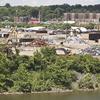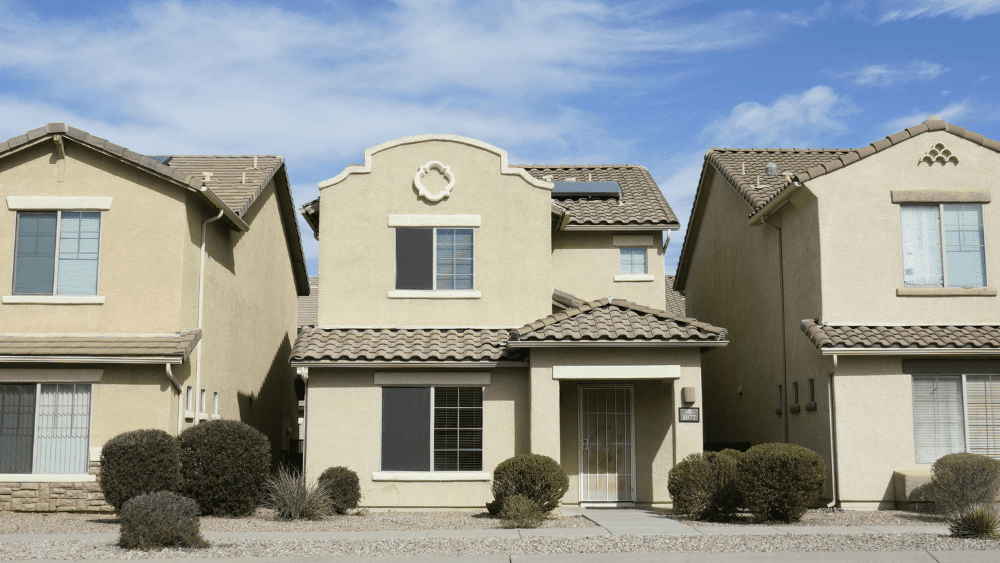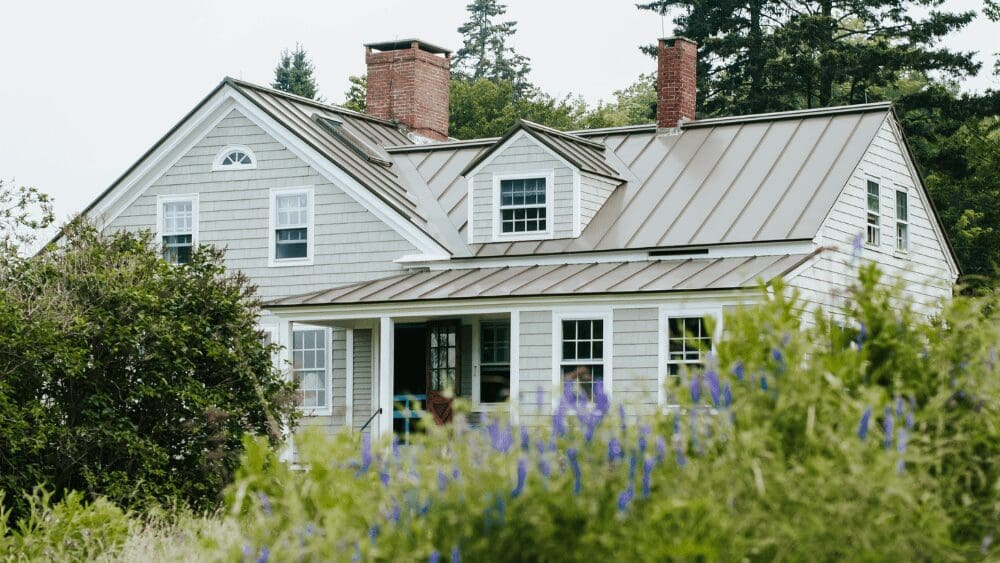Building a house in Melbourne usually costs between $2,200 and $5,500 a square metre, according to recent Australian construction industry research.
This means a standard Melbourne house would cost anywhere between $556,600 and $1,391,500 to build, based on the city-wide average new house size of 253sqm.
This is in line with what residential builder and BuildHer founder, Rebeka Morgan, sees on the ground.
“Generally speaking, most Melbourne homes are going to cost between about $3,000 and $5,000 a square metre to build a home,” she explained.
“That said, we do see houses which cost as much as $8,000 a square metre. However, that would be a premium build and tends not to be too common.”
So if you’re thinking of building a home in Melbourne, what will impact the cost of what you pay? And what are the key factors you should consider?
“When you're building a larger, premium home, the cost can escalate quickly, especially with high-end finishes, custom designs, and intricate details like bespoke joinery or specialty materials,” Morgan explained.
MORE: Where can you buy Australia's cheapest land in 2024?
Using a volume builder is a great way to lower building costs, as are single-storey designs. Custom homes allow for personalisation, but come with added expense from the design phase right through to construction. Picture: Beachwood Homes / realestate.com.au
Cost to build a house in Melbourne – per number of bedrooms
The number of bedrooms you choose to have in your new house will be one of the most important factors affecting how much it costs to build.
That’s because most construction jobs are cost on a “per square metre” basis, and the more bedrooms you have the larger your home is likely to be.
Even then, according to Morgan, the cost of building, say, a four bedroom home, can vary considerably.
“The overall cost doesn’t just depend on the size of the home but also on the finishes and details you choose,” she said.
“For instance, the cost of adding custom joinery, higher-end materials, or specialty features like a bespoke kitchen or bathroom can significantly increase your budget.”
Cost of building a 3-bedroom house in Melbourne
It would cost anywhere from $385,000 to $962,500 to build a standard three-bedroom house of 175 square metres.
However, if you were looking to build a premium home, it could cost as much as $1.4 million, according to Morgan’s estimates.
““The difference in cost largely comes down to the level of customization and quality of materials,” she says. “Premium homes often include high-end finishes, custom cabinetry, and bespoke design elements that really drive up the price.”
Cost of building a 2-bedroom house in Melbourne
It costs anywhere from $264,000 to $660,00 to build a standard two-bedroom house in Melbourne, assuming a home that is just 120sqm.
This is less than half the size of the average new house in Melbourne – although Morgan notes that this would not be completely out of the question for a small house on an inner-city block.
“Smaller homes, especially in inner-city areas, are becoming more common as land availability decreases and people prioritise location over size,” Morgan said.
“Even with fewer bedrooms, these homes can be expensive to build due to higher land costs, difficulty delivering materials and working onsite, and demand for premium finishes in smaller spaces.”
Cost of building a 4-bedroom house in Melbourne
It usually costs anywhere from $572,000 to $1,430,000 to build a four-bedroom house in Melbourne.
This assumes a home of 260sqm, which would be typical of a four-bedroom home with two bathrooms (or even a four-bedroom house with two bathrooms and an ensuite).
For a premium home of this size, however, it could cost as much as $2,080,000, according to Morgan’s calculations.
Cost of building a 5-bedroom house in Melbourne
Building a five-bedroom house in Melbourne should cost between $660,000 and $1,650,000 for a standard property of 300sqm.
However, if you were to go “all out” on a premium build, you may be up for as much as $2.4 million, says Morgan.
“Luxury builds often involve much more than just additional square metres – it’s about the level of craftsmanship and the quality of every feature.”
MORE: Victoria emerges as new first-home buyer haven
Second storeys add as much as $1000 per square metre to the cost of a build due to structural complexity and additional materials and skilled labour. Picture: Metricon Homes / realestate.com.au
How much does a second storey cost to build in Melbourne?
Building a second storey can add as much as $1000 a square metre to the cost of building, according to Morgan.
After all, while a single-storey house requires a larger foundation and roof area, including an additional storey adds to the difficulty of the build.
“Adding a second storey involves more complex construction, like scaffolding, staircases, and additional external walls,” she explained.
“It’s not just the materials – there’s more labor and coordination involved, which drives the cost up significantly.”
A general guide is that a second storey should add around 10% to 20% to construction costs.
For instance, if you’re building a single storey four-bedroom, two-bathroom home in Melbourne and you pay $800,000, it would cost anywhere from $880,000 to $960,000 to build a two-storey home of the same size and using the same materials.
Is it cheaper to build or to buy a house in Melbourne?
It can sometimes be cheaper to build a house rather than buying one in Melbourne. However, whether that’s the case will depend on several factors, including:
The value of the land
The average cost of vacant land in Melbourne is $394,000, according to one report. However, you’re likely to have to pay a lot more in prestigious suburbs close to the city centre.
The cost of building
Obviously, the more expensive the build, the greater the overall cost.
Transfer (stamp) duty
Victoria has some of the highest levels of stamp duty in the country. For instance, buying a $1.5 million established home as your primary place of residence would usually set you back $82,500 in stamp duty.
Given that stamp duty is calculated on purchase price – and the cost of buying land tends to be much cheaper than buying an established home – you could make a significant saving by buying land to build.
Transfer duty concessions
That said, you may be eligible for a stamp duty concession or exemption if you’re buying your first home. To be eligible for an exemption, you need to be buying a home or vacant land valued at less than $600,000. Concessional rates apply to land and properties valued between $600,000 and $750,000.
First Home Owner Grant
The First Home Owner Grant provides $10,000 to eligible first home buyers who buy or build a new home valued up to $750,000.
Other costs
You should also factor in any other costs, such as building and pest inspections, removalist and solicitor’s costs, and – if you need to live somewhere while you build – the cost of renting another home.
MORE: Builders offering beautiful Hamptons-style home designs
The materials, finishes, fixtures and fittings you choose will also affect the cost of a build, even if your design or floorplan is simple. Picture: Roseleigh Homes
What factors affect the cost of building a home in Melbourne?
The cost to build a home is usually influenced by six key factors.
1. The size of home
The average size of a new property in Melbourne is 250.3sqm – larger than the average Australian home size of 195.8sqm, according to a Commsec report. Because larger homes require more materials, they also tend to be more expensive.
2. Materials
This is where the real cost of building a home often comes in.
“While houses aren’t necessarily getting much bigger, they are getting more specced out,” Morgan explained.
“Homeowners today are choosing higher-end materials, custom joinery, and specialty finishes, which significantly drive up the overall cost.”
3. The site you’re building on
“Building on sloping or difficult sites can add a lot of extra costs because of the need for excavation, retaining walls, and more complex construction processes,” Morgan explained.
“You also need to think about soil quality and drainage, which can impact the foundation work needed.”
4. Any delays
Weather and other delays can significantly affect how a building project progresses and add unexpected costs. Delays can impact scheduling, which makes it harder to coordinate trades efficiently and can push out project timelines.
“Delays aren’t inevitable, but having a realistic timeframe and understanding how the project works are crucial,” Morgan said.
“Keeping the builder’s schedule on track and being proactive about ordering materials can save a lot of headaches – and costs – down the line.”
5. How complex your design is
Project homes tend to be more affordable because builders benefit from economies of scale, ordering materials in bulk and repeating the same design multiple times.
“When you go for a more complex or bespoke design, it increases costs because you’re engaging specialists and using unique materials,” Morgan said.
“While custom homes allow for personalisation, they come with added expense from the design phase right through to construction.”
6. Costs outside of the build itself
“A lot of people forget about the external costs when budgeting for a build,” Morgan noted.
“Things like driveway paving, garden landscaping, or fencing can really add up, so it’s important to plan for these right from the start.”
MORE: What the Metricon sale means for Aussies building homes
Knockdown rebuilds offer the opportunity to build a duplex on the same block, but you will need to factor in costs involved due to the increased complexity of the design, and whether the outlay will be covered by rental income or sale profit from the second dwelling. Picture: realestate.com.au
FAQs about building a house in Melbourne
Here are some of the most common questions people have about building a house in Melbourne.
What is the cheapest way to build a new house in Melbourne?
The cheapest way to build a new house in Melbourne is to use a project home builder.
“Project homes are more affordable because builders can leverage economies of scale,” Morgan explained.
“They’ve built the same design multiple times, so the process is streamlined, and they can source materials in bulk, which helps keep costs down.”
MORE: Victoria's best display homes for 2024
Do I need a contingency buffer? How much should it be
Yes, having a contingency buffer is essential. Morgan recommends starting with a 15-20% buffer at the beginning of the project, especially during the design phase when costs can be less predictable.
“At the start, you should plan for a larger buffer, around 20%, because things can change as the design evolves and unknowns arise,” she explained.
“As the project progresses and you’ve locked in a builder and materials, you can reduce that buffer to around 5-10%, depending on the complexity of the build.”
How long does it take to build a house in Melbourne?
It usually takes between four months and 12 months to build a house, after you’ve bought the land.
Is it cheaper to renovate or knock down and rebuild?
The answer will depend on how difficult the renovation is, and how much of the existing home you can keep.
“Renovations tend to be more complex to price because there are more unknowns, while a rebuild gives you a clearer idea of costs upfront,” Morgan said. “Renovations often come with hidden costs and surprises.”
“If you're doing major work like replacing roofs, windows, or gutting walls, it might actually be cheaper to knock down and start fresh. But, if you can preserve key parts of the home – like a few rooms or the foundation – you can save significantly by renovating.”
What government grants are available for new homes in Melbourne?
Below are list of some of the more common government grants that may be available if you’re buying a new home in Melbourne:
First Home Owner Grant
This scheme provides $10,000 to eligible first home buyers who build a new home in Melbourne valued up to $750,000.
First Home Buyer Duty Concession, Exemption or reduction
First home owners pay no stamp duty on land or properties valued up to $600,000, and a reduced rate on homes and land valued between $600,000 and $750,000.
HomeBuilder
HomeBuilder provided a $25,000 grant towards new houses for eligible contracts entered into between 4 June 2020 and 31 December 2020 and $15,000 for new contracts entered into between 1 January 2021 and 31 March 2021. While it doesn’t apply to contracts entered in after then, the deadline for submitting a claim for the grant has been extended to 30 June 2025.
MORE:
How much does it cost to build a house in Sydney?
How much does it cost to build a house in Perth?



















 English (US) ·
English (US) ·